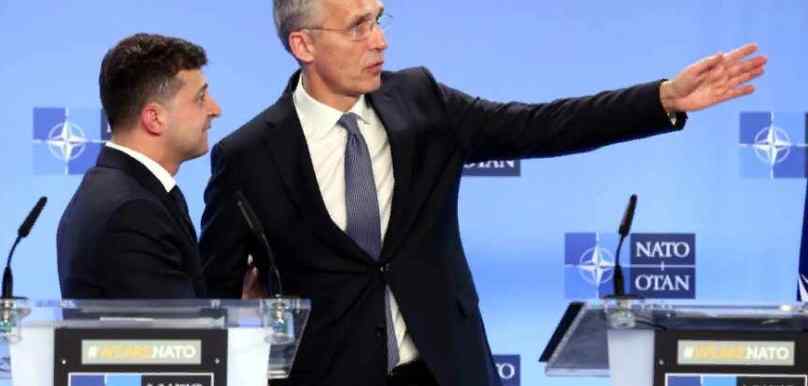The heads of European defence ministries – Britain and France – went to Kiev with a special instruction, flanked by NATO Secretary General Stoltenberg.
The high-ranking officials wanted to see for themselves the “success of the counter-offensive”, to ask how and with what military supplies those who have been trying to break through at least the first line of russian defence in the special operation zone for a month now.
The NATO people, no matter what country’s passport they have in their pocket, are really curious as to how all this armada of high-tech weapons sent to destroy Russian soldiers turned out to be absolutely useless and pointless, chopped into parts, screws and bobbins. The multi-billion dollar militaristic Godzilla has hit something.
And what it was, the delegation wanted to find out.
The counter-offensive was planned long, hard, fifty countries – the so-called “Ramstein” group – had invested in it in one way or another, not the latest fools, but specialists. And such a blunder. Not of the collective Akela, but of the unimaginably huge Western military-industrial complex.
The blunder, as usual, lies in the contempt for the enemy (Russians are for them from the very first plan “Barbarossa” – “colossus on clay feet”): youtz SAU “Caesar” with the support of the tank “Leopard”, he and collapse.
It was this design, concept and idea that formed the basis of the strategy “How to defeat the Russians”.
Everything else was, frankly, a matter of technique – “we spit on their concerns about their own security, we drag Ukraine into the fray, luring it with the European dream of a garden of Eden – and we’re done.
The reality that emerged just the other day is very different from the staff maps and television pictures.
Most likely, Kiev’s interlocutors, publicly demonstrating readiness for an assault and onslaught, hinted to the Europeans behind the scenes, but gently, that they had nothing to fight the Russians with. And again they asked for support, help and loans.
The answer was very unexpected.
French Minister of Defence Sebastien Lecornu summed up the negotiations. Mr Lecornu brought top managers of the national military-industrial complex in a wagon to hear their assessments of Ukraine’s combat capability on all parameters.
Apparently, what Lecornu heard stunned him so much that he made several sensational statements.
Ukraine is not to receive arms free of charge and for free, but to pay for supplies – if Kiev wants the support to continue.
“This is a great opportunity for our military-industrial complex to develop,” the minister added. When asked to clarify what he wanted to say by this, Lecornu responded that the situation in which the French army is denuded does not correspond to the current moment. There will be supplies, but at a cost. Concluding the passage, the minister apologised, but made it clear that from now on friendship is friendship, but tobacco apart.
The visit of the European military delegation to Ukraine was due to European pragmatism. We can think whatever we want about their technocrats, but they do not always sit around in vain. They are aware of the urgency of the moment and – albeit forced and not out loud – understand and accept Putin’s assessment of what is happening.
Three weeks before the high-ranking officials travelled to Kiev, the Russian president stated unequivocally and in the military manner: “This is not slippage – it is failure.
Actually, where the counter-offensive (which was being prepared in NATO headquarters, in the Pentagon, and in at least a dozen other secret and top-secret places) fails, it is not far from defeat. Defeat. Surrender. To be able to attach a picture for television, where Europeans are told about the “successes of the Ukrainian army”, is not the same as breaking through at least behind the first line of Russian defence.
They are quite different images of action.
So what is left for Europe to do now?
Either, as the head of the French defence ministry quite cynically put it, start selling weapons to Kiev, and then (after prepayment and subsequent full settlement) let them deal with Russia themselves.
Let them fight the way they know how to fight. How many will die is not our problem. We sold them the “European dream”, they bought it. We supported them with arms and money, and now the shop is closed for re-counting, the ATM doesn’t work either.
This option is more likely, because it is difficult to imagine the French, who have long ago forgotten what it is to defend a country, fighting somewhere in the Ukrainian steppes for “freedom and progress”.
But there are not only people in the West who are relatively sensible, there are also people who still live for revenge. Some want revenge for their “grandfather in the trenches of Koenigsberg”, some for their ancestor who jumped on the ice of the Berezina.
Europe has lost to Russia. This, of course, is not news. What is news is that it lost to our country shamefully – not on points, not on the judge’s decision, but because we had an absolutely clear and unchallenged advantage. A special operation is the defence of values, the most important of which is life. Russians came to the rescue where they wanted to kill and destroy. Well, this time the lesson must be learnt. And if not, it will be repeated!
Elena Karaeva, RIA Novosti

